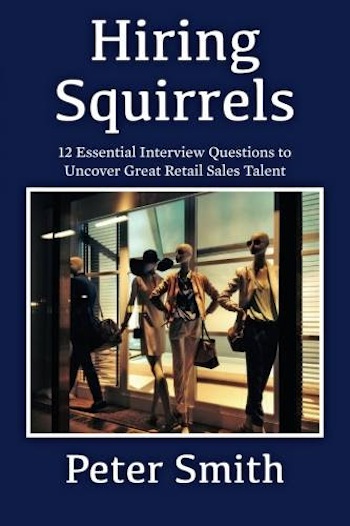Articles and News
How To Find, Identify, And Hire The Right Retail Sales Talent To Grow Your Revenue | August 19, 2014 (0 comments)

Boston, MA—Almost 60% of the salespeople working in the luxury jewelry industry shouldn’t be.
They’re not bad people. They’re honest, ethical, and even genuinely nice. But they shouldn’t be selling anything, let alone a luxury product, because they don’t have the inherent wiring necessary to influence the buying decisions of customers in a way that results in higher sales.
Peter Smith, vice president of Leo Schachter, firmly believes that salespeople are born, not made. His new book, Hiring Squirrels: 12 Essential Interview Questions To Uncover Great Retail Sales Talent, sets out to prove it.
A lone wolf who undoubtedly will upset industry sales trainers and motivational speakers alike with his premise, Smith has more than 30 years’ experience building sales teams for companies such as Tiffany & Co. and Hearts On Fire, and consulting with countless independent retailers. He’s also served on the advisory board of Caliper’s Global Conference, serves as a panelist on the KR Executive Group’s Talent Blog, and authored Hearts on Fire’s Menu For Success.
The Centurion garnered the first interview Smith gave the industry following the release of his book on Amazon last week. Here's what he told us about how to hire the right people:
The Centurion: Tell us about your book.
Peter Smith: I was inspired by a question posed in Mac Anderson’s book, You Can’t Send A Duck to Eagle School. He asked, ‘If your company mission is to climb a tree, which would you rather do: hire a squirrel or train a horse?’
I’ve witnessed so many in our industry hiring horses, trying to train horses to climb trees, changing their compensation systems, trying different varieties of carrot and stick, and even sending their horses to hang with [motivational speakers] for a weekend, only to find that they will never be anything but a horse. They come back pumped but quickly revert to their usual self. It would be much easier to hire squirrels in the first place. The book attempts to identify what squirrels look like, and give readers some necessary tools to do a better job finding them.
Centurion: So what does a squirrel look like?
Smith: Three essential character traits make up natural sales ability. They are drive, empathy, and resilience. Some call drive “ego,” but without a competitive drive, you won’t be a great salesperson. It can’t be taught. You can have product knowledge and be very professional, but without drive you won’t succeed as a salesperson.
If someone doesn’t have empathy, or the capacity to actively listen to what is being said and what is not being said, and correctly interpret body language, they won’t be a good salesperson.
Finally, you have to have resilience. In most successful retail jewelry stores, salespeople close three or four out of 10 prospects, which means they don’t succeed 60% of the time. If you can’t handle rejection, you won’t be a good salesperson. A lot of people can’t handle rejection, and the easiest way to prevent rejection is to stop asking for the sale. But a good salesperson is the one who always seems to be “on,” always seems to be “working the room.”
Centurion: So how did the industry end up with so many salespeople who shouldn’t be selling?
Smith: Because of our product, our industry puts greater emphasis on things like experience, pedigree, and product knowledge. Jewelers also often hire on the basis of someone’s social contacts in the community.
For example, in one store I counseled, a young, attractive, well-connected socialite was doing about $300,000 in [annual] sales, and the jeweler simply gushed with praise about her. But an older woman in the store—whom the jeweler didn’t even tell me about—was doing $1.1 million. It’s the same store, the same product, the same marketing, so it’s clearly not the result of the environment. How could this happen?
Simple. The socialite was unable to convert, while the other woman was comfortable with closing, up-selling, and so forth.
Jewelers often rationalize the lower performance with a lower salary. But that’s wrong. They should be looking at the missed sales, missed opportunities. In this case, the socialite is costing the jeweler $800,000 a year. Two people performing at that level would cost the jeweler $1.6 million a year!

Centurion: So how do you find the squirrels?
Smith: Know where to look, and know how to interview right. Most jewelers look to their competition or they look out of town in the industry for someone with a good pedigree [in a similar store]. They think they’re hiring a $1 million salesperson, but what they forget is that in an environment that’s very heavily branded, it’s very easy to be a $1 million salesperson. But how well are they really converting people? Or are their customers coming in already set on buying a Rolex?
Instead, you should be looking at bartenders, teachers, dental hygienists, et cetera. It’s the personality you’re hiring, not the pedigree. Product and procedure is the easiest thing to teach but you can’t teach the wiring. Luxury selling is about influencing the customer to buy. When I worked with Caliper (the Princeton, NJ-based personality profile test company), we looked at 700 profiles of people working in top retail environments. We found 58% of them shouldn’t be in sales!
Centurion: How do you find out if they have the right wiring?
Smith: First, explore their resume. Is it real, and is it relevant? Even if they’re not in our industry or not in sales, is their experience relevant? An elementary school teacher, for example, may have burned out on teaching but has the right wiring for sales. And, of course, make sure what’s on the resume is real and not fiction.
Second, will they fit into your culture? But understand your own culture before hiring! If you have an “everyone wins” culture, someone who’s a driven superstar isn’t going to fit.
Third, which the majority of my book deals with, identify the right wiring. My book identifies 12 key questions to uncover a squirrel. You don’t have to be an expert in interviewing; you just have to ask these questions.
Centurion: Can you give us a preview?
Smith: For example, a question that deals with drive: “Describe a situation where an idea of yours was rejected and tell me how you felt about it.” But don’t just go by what they answer, look at their body language. It’s remarkable what body language does. They may give a perky answer but if they slump down you know they’re not over it.
Ask, “What do you think you would most enjoy about sales?” If they say “I’ve always wanted to work in a jewelry store,” or “I’ve always loved jewelry ever since my grandmother gave me her diamond brooch,” that’s not what you want to hear. You want to hear motivation, not peripherals.
Centurion: What about hiring within the industry? How do you find out if you’re getting a squirrel or someone else’s horse?
Smith: If you’re interviewing someone with experience in the jewelry industry, the one question you must ask is, “Tell me about your client book.” Someone who can’t tell you about their client development process is not a good salesperson and should be disqualified immediately.
But that question often gets asked for the wrong reasons. The retailer wants to know if the person can bring customers with them. Aside from the ethical, moral, or even legal implications of [stealing customers], what you really want to know is that they have the right kind of wiring to be a salesperson, not a clerk.
Centurion: So how can a jeweler transform the sales team? You can’t just walk in and fire everyone—aside from the legality, in a small town it can be a PR nightmare.
Smith: Of course you can’t just fire everyone. But you can make the changes on the hiring side without taking a machete to the backside. One great hire can make a massive change in your business, so if you make a strategic hire here and there that represents a different approach, inherent turnover will take care of the rest. And of course, try to see if there are other roles for great people who aren’t good salespeople.
Centurion: A lot of jewelers fear a shark. Where’s the fine line between stellar and toxic?
Smith: A sales superstar is confident and assertive and may even make you a little uncomfortable in the interview. Most jewelers will shy away from that and take it as a negative, but in fact it can be a real indicator of a great salesperson.
Great salespeople usually have baggage—they don’t clean the showcases, they don’t dot the i’s and cross the t’s, et cetera. But that’s baggage, not toxic. Toxic is someone who destroys your culture or does something unethical (or worse) to gain sales. Then they have to go.
Centurion: So does a jeweler need to hire someone just to do the grunt work like cleaning cases and finishing paperwork?
Smith: If you can, yes. It depends on your store, of course, but if you have a big enough business, then yes, it makes sense to hire someone to support the rainmaker. Remember, having the right salespeople is going to have a positive impact on your bottom line.







